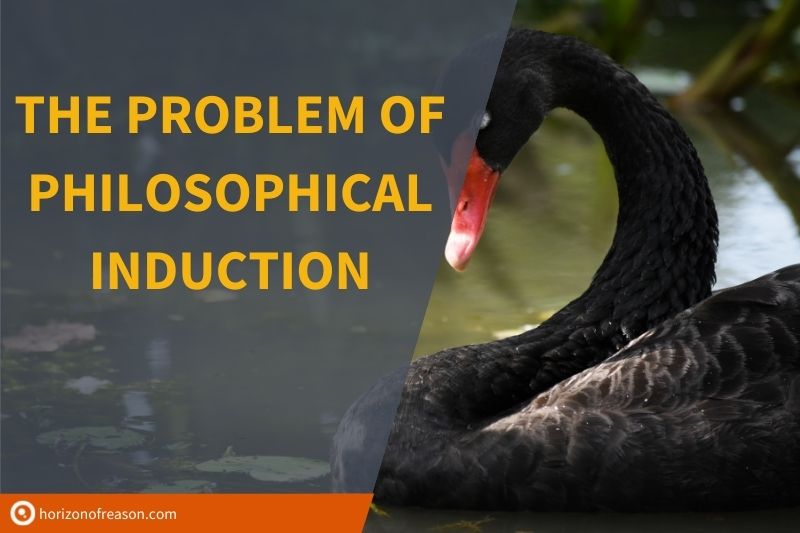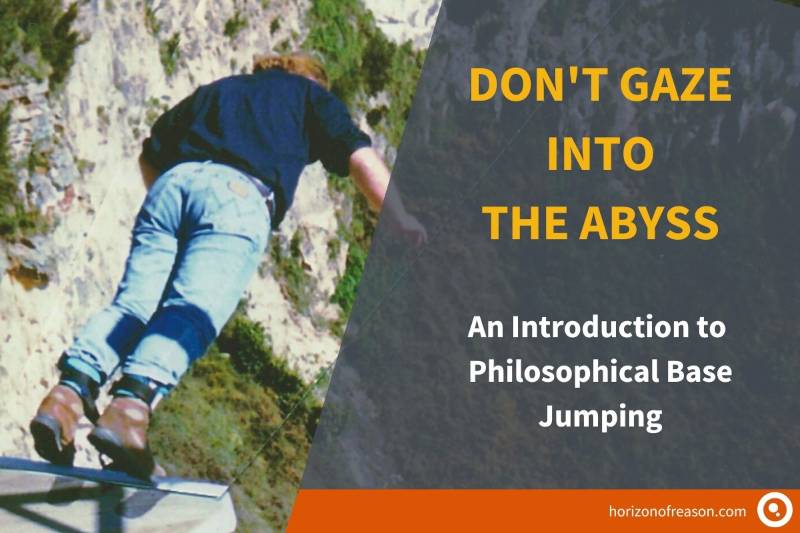
Hume Arguments for the Problem of Induction

Peter Prevos |
2966 words | 14 minutes
Share this content
Inductive inferences play an essential role in our every day and scientific thinking. Francis Bacon (1561–1626) argued that we could derive universal principles from a finite number of examples, employing induction. A well-known example of a generalising induction is:
- Millions of swans have been observed
- All of them were white
- Therefore by induction the statement “all swans are white” is true
This essay investigates the sceptical arguments regarding the validity of inductive inferences by David Hume and the solution proposed by Karl Popper. Although Popper’s solution has significant practical implications, Hume’s problem remains unsolved, and a different approach is needed to account for the success of inductive reasoning.
The Problem of Induction
Philosophical inductions amplify particular observations to universal laws to predict the behaviour of physical systems. The problem of induction is what justification can there be for making such an inference? Can we make a universal claim based on a finite number of observations?
David Hume (1711–1776) is usually credited to be the first to ask this question and analyse the problem of induction. Hume concludes that there is no rational justification for inductive references and that Bacon was wrong in assuming that we can derive universal principles from observation of the particular. Many philosophers have attempted to solve this problem, but there is still no consensus on how to solve the issue, or whether it is solvable.
We are still in the same position Hume put us in. Karl Popper (1902–1994) accepts the validity of the Humean critique of induction but believes that science does not depend on induction at all. If Popper is correct, the induction problem seems to evaporate.
Hume’s argument for inductive scepticism
Hume outlines his argument for inductive scepticism in both the Treatise of Human Nature/ and the Enquiries Concerning Human Understanding. Hume also summarises his position in an abstract of the Treatise he published.
Hume’s analysis of induction is closely related to his ideas on causation, for ‘all reasonings concerning matter of fact seem to be founded on the relation of Cause and Effect’. Hume argues that when we see one billiard ball hitting another, what we perceive is that they strike and the ball, which was formerly at rest, now is in motion. From this perception, it is evident that the two balls touched each other before the motion of the second ball commenced. Contiguity in time and place is thus a requisite circumstance for the operation of all causes. It is also evident to Hume that the two motions follow each other in time (priority) and Hume also believes that there is a constant conjunction between cause and effect in that similar circumstances always produce similar effects. Hume notes that:
T’is commonly suppos’d, that there is a necessary connexion betwixt the cause and effect, and that the cause possesses something, which we call a power, or force, or energy.
Hume can, however, not see anything beyond contiguity, priority and constant conjunction between cause and effect. The actual connection between cause and effect is an occult quality, and Hume remarks that “nature has kept us at a great distance from all her secrets.”
The powers by which bodies operate are entirely unknown as we perceive only their sensible qualities. Hume wants to find out what this inference from cause to effect is founded upon. The stakes are high, as Hume considers the inference from cause to effect to be the cornerstone of all our knowledge about the world, except for mathematics.
Hume notes that, although the premise of a predictive inductive inference is true, the conclusion can nevertheless be false. Although we have always perceived the same cause and effect, their connection is not a necessary truth:
The mind can always conceive any effect to follow from any cause, and indeed any event to follow upon another: whatever we conceive is possible, at least in a metaphysical sense.
The conclusion that “all swans are white” was, until Dutch explorer Willem de Vlamingh in 1697 was the first European to see a black swan in Australia, considered a fact. De Vlamingh thus falsified the previously regarded as a universal truth that all swans are white. Hume concludes from the fact that inductions can produce false conclusions from true premises that induction can not be a rational inference.
The claim that induction is not a rational inference depends, according to Aubrey Townsend, on two steps. The first is to conclude that induction is not demonstrative or deductive. In the second stage, he also needs an argument to show that if induction is not demonstrative but probable, then still it is not a rational inference, because it rests on a presumption that can only be justified by a circular use of inductive reasoning.
Hume, in line with Cartesian thinking, believes that rational reasoning is by definition error-free and inductive inferences can therefore not be rational. The only way we can make inferences from the impression to the idea (induction) is, according to Hume, by relying on experience of the constant conjunction of the objects in question. Hume writes:
Even after we have experience of the operations of cause and effect, our conclusions from that experience are not founded on reasoning or any process of the understanding.
The core of Hume’s argument is the claim that all probable arguments presuppose that the future resembles the past (the Uniformity Principle) and that the Uniformity Principle is a matter of fact. That the future resembles the past is, however, not something we derive from reason but from experience alone. Hume argues that because ‘it is no contradiction that the course of nature may change’, any object may be causing different effects in the future and all previous inductions will fail.
Before 1697, everybody who had ever seen a white swan assumed, following the Uniformity Principle, that all future swans would also be white. This principle implies that the results of an inductive argument is probable, but never certain, as pointed out earlier. This again leads to the circularity objection, because the Uniformity Principle, as a justification of induction itself is based on an induction. Hume thus concludes that not reason, but custom alone, leads us to conclude that induction is a valid inference.
To justify induction and to show that it is rational, Hume needs to be able to offer that though on particular occasions induction will take us from truth to falsehood, as in the case with the swans. Yet, in the long run, induction will get us nearer to the truth. That is what Descartes attempted to do with the argument based on a proof of God’s existence and veracity. Hume wanted to show that any such program will fail.
Reactions to Hume’s argument
Hume’s problem of induction strikes at the very foundation of empirical science. Following Hume, all inductive reasoning should be accompanied by a disclaimer, warning that every connection with reality is based on pure coincidence.
Bertrand Russell thought that Hume’s philosophy ‘represents the bankruptcy of eighteenth-century reasonableness’. If there is no solution to Hume’s problem, “there is no intellectual difference between sanity and insanity”. Several arguments have been developed in response to the problem posed by Hume.
Deductivism
Hume’s argument depends on the claim that all inductive inferences presuppose the Uniformity Principle and that this principle can not be derived from reason, but only from observation. The question to be asked is whether all inductive reasoning indeed depends on the Uniformity Principle. David Stove argues that inductive arguments depend on the Uniformity Principle because the addition makes inductive arguments deductively valid.
If Stove is right, then all inductive arguments are deductive arguments with a hidden premise. A characteristic difference between inductive and deductive arguments is that, if the premises are correct, the outcome of a deductive argument will always be valid as well. This is not the case in inductive reasonings, as Hume pointed out. If the addition of the Uniformity Principle would render an inductive argument deductively valid, then the Uniformity Principle must be false, because the principle would be shown to be false by every inductive failure. Stove’s lines of reasoning render the Uniformity Principle false, something which most people would not be willing to accept.
The success of science
Another reply to Hume is by pointing out the success of the application of inductive reasoning in science. The fact that I am writing this essay on a computer can be considered proof that the rules of physics, on which the technology enabling the existence of this computer are based, are true. These rules of physics are, in turn, based on ampliative reasoning through inductive inferences. From this follows that inference is a valid way of concluding the universal from the particular. Other modes of obtaining knowledge, such as divination, do not have such a reliable track record and are thus inferior to the empirical sciences. The problem with this justification is that it uses the scientific method to justify the scientific method. To predict that the scientific method will continue to be successful in the future because it has been successful in the past is a circular argument.
Popper’s Critical Rationalism
Karl Popper characterises the scientific method not as a process of observation and inductive reasoning, but as a process of conjectures and refutations. Popper describes a scientist as:
… a man dressed in black, who, in a black room, looks for a black hat, which may not be there […] he tentatively tries for the black hat.
There is, according to Popper, “no such thing as a logical method of having new ideas” and discovery of scientific theories always contains an irrational element. Albert Einstein refers to this irrational element as an intuition, based on empathy (Einfühlung) with experience. This view is in contrast to Isaac Newton, who insisted that he does not invent theories (hypothesis non fingo) and that intuition plays no role in science. It is interesting to note that according to his assistant John Conduitt, Newton discovered a critical aspect of the theory of gravity not from meticulous observations of planetary motion, but from an apple he saw falling from a tree.
Popper’s philosophy of science is, however, not a form of irrationalism, but critical rationalism. Popper argues that every theory should be subjected to a rigorous critical testing regime, aimed at attempting to falsify that theory.
Critical rationalism is closely related to Popper’s view on the problem of induction. His solution to the problem is, in short, that science does not use induction as a means to obtain new knowledge. As scientific theories are based on conjectures, scientists can only make deductions from the conjectured theories and test whether the predictions are valid by looking for possible refutations.
Popper believes that Hume’s refutation of inductive inference from a logical point of view is clear and conclusive. Still, he is dissatisfied with Hume’s psychological explanation of induction in terms of custom and habit. Hume believes in the psychological power of induction; not as a logically correct procedure, but as a procedure which animals and people make use of.
The answers are given by Hume to the logical and psychological problems of induction lead to the conclusion that inductive inferences are irrational. All knowledge, according to the Humean view, is mere irrational habit or custom and is rationally totally indefensible.
Popper is not satisfied with this sceptical conclusion and believes that he has a solution to Hume’s psychological problem. He reformulates Hume’s problem by widening the scope from instances to laws and by including counterinstances (refutations). Hume’s modified problem of induction now reads: Are we rationally justified in reasoning from instances, or from counterinstances, of which we have had experience to the truth or falsity of the corresponding laws or to cases of which we have had no experience?
Popper’s answer to the problem is, as implied by Hume that we are not justified in reasoning from an instance to the truth of the corresponding law. We are, however, justified in reasoning from a counterinstance to the falsity of the corresponding universal law. The acceptance of one counterinstance (the discovery of black swan) immediately falsifies the law (all swans are white).
Induction may be logically invalid, but refutation or falsification is a logically valid way of arguing from a single counterinstance to the refutation of a corresponding law. Logic forces us to reject even the most successful law the moment we accept one single counterinstance. The result of Popper’s argument is that all universal laws or theories forever remain conjectures until refuted by the discovery of a counterinstance.
The Uniformity Principle
Popper seems to have found a way out of the sceptical problems posed by Hume. The solution he proposes is, however, not what most philosophers would have hoped for, as his re-interpretation of Hume’s problem of induction leads to the view that all knowledge is a temporary approximation.
Although Hume’s reasoning has left philosophy with a huge conundrum, he does not seem to be convinced himself of his conclusion that causation is a category of the mind: “Thought may well depend on causes for its operation, but not causes on thought. This is to reverse the order of nature, and make that secondary, which is primary”.
Popper’s reformulation of Hume’s problem is an attempt to rescue a point of reference for scientific knowledge from the ashes of Hume’s argument. Both Hume and Popper are both firm believers that the Uniformity Principle is true, although no justification, other than experience, can be given.
It is a nearly generally agreed view that the problem of induction can and has to be solved only within the framework of an ontological reality and acceptance of the Uniformity Principle. Acceptance of the Uniformity Principle is problematic, and in recent times the principle has come under attack from philosophers and physicists. Ilya Prigogine regards the Uniformity Principle confirmed by the success of the theories of physics, but also as the most solid obstacle to understanding and justifying the nature of human freedom, creativity and responsibility.
He argues that we need to go beyond the determinism of the Uniformity Principle and find a way to embrace ‘indeterminism’ in physics. The Uniformity Principle allows prediction of future events, based on patterns from the past. The same principle also allows to ‘postdict’ past events by looking at the current situation. The laws of physics, as they are based on the Uniformity Principle, also allow prediction and postdiction of events.
In physics, the direction of time does not seem to matter. In everyday life, however, time certainly seems to have a direction; we can’t ‘unstir’ a cup of tea to separate the milk from the tea and we always get older, but never any younger, and so forth. Nature involves both time-reversible and time-irreversible processes, but irreversible processes are the rule and the reversible the exception.
Suppose Prigogine is right and time-irreversible processes are the rule. In that case, the Uniformity Principle is not only uncertain but wrong and can only be interpreted as a category of the mind.
The Success of Technology
There does not seem to be any satisfactory solution to the difficulties Hume raised. Popper’s theory is only a partial solution, as it presupposes the Uniformity Principle, which in turn can not be justified. Are we left with the world as unpredictable chaos? Are we forced to admit that, in the words of punk singer Johnny Rotten: “There is no solution to the problems, so enjoy the chaos”?
The apparent success of the technology, however, seems to disprove the sceptical conclusions of Hume and Prigogine’s call for indeterminism. We are surrounded by technology that validates the laws of physics, which are all based on deterministic models of reality derived by inductive reasoning. We are left with a reality without logical justification.
Suppose there is no logical justification for scientific inferences we are forced to accept instrumentalist theories. In my work as a professional engineer, I often say that there is nothing more practical than a good theory. Instrumentalism is, in this context, the view that concepts and theories are merely useful instruments whose worth is measured not by whether the concepts and theories correctly depict reality, but how effective they are in explaining and predicting phenomena.
Instrumentalism is not an answer to the logic problem of induction, as argued above. Instrumentalism is a pragmatic theory that bypasses the metaphysical problems of inductive reasoning. To the instrumentalist, inductive reasoning is a powerful tool to attempt to understand the reality we are presented with.
References
Earman, John and Salmon, Wesley C., ‘The confirmation of scientific hypotheses’, in: Salmon, Merrilee H., editor, Introduction to the philosophy of science (Prentice Hall, 1992), pp. 55–66, printed in Townsend (1998), p. 176–183.
Einstein, Albert, Mijn kijk op het leven (My view of the world), (Amsterdam: Corona, 1990).
Hume, David, An abstract of a book published; entitled a Treatise of Human Nature &c, (London, 1740).
Hume, David; Selby-Bigge, L.A., editor, An enquiry concerning the human understanding, and an enquiry concerning the principles of morals, (Oxford: Clarendon Press, 1894).
Hume, David; Wright, John P., Stecker, Robert, and Fuller, Gary, editors, A treatise of human nature, (London: Everyman, 2003).
Popper, Karl, ‘The problem of induction’, in: Curd, M. and Covers, J.A., editors, Philosophy of science: the central issues, (New York: W.W. Norton, 1998), pp. 426–432, Originally published in: The logic of scientific discovery.
Popper, Karl R., Conjectures and refutations, 5th edition. (London: Routledge, 1989).
Prigogine, Ilya, The end of certainty, (New York: The Free Press, 1997).
Russell, Bertrand, History of western philosophy, 2nd edition. (London: Routledge, 1961).
Stove, Davide, ‘Hume, probability and induction’, in: Chappell, V.C., editor, Hume: A collection of essays, (1966).
Townsend, Aubrey, editor, Origins of modern philosophy B, (Melbourne: Monash University, 1998).
Widdershoven-Heerding, C., editor, Wetenschapsleer (Philosophy of science), (Heerlen, the Netherlands: Open Universiteit, 1995).
Share this content


